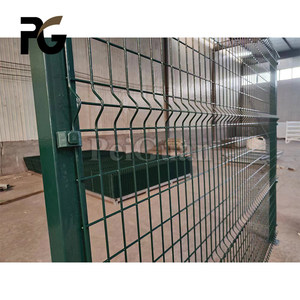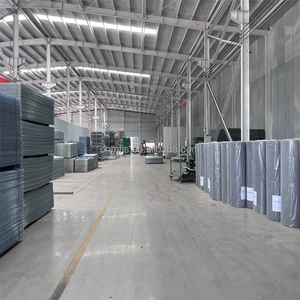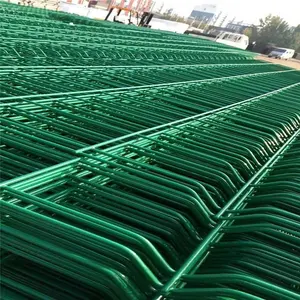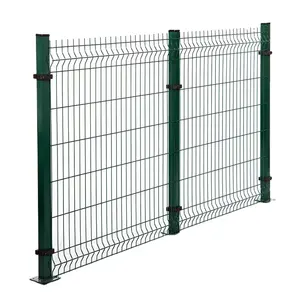(97739 products available)







![[Rustproof]Customized Galvanized Steel Metal <strong>Garden</strong> <strong>Fences</strong> Panels Outdoor PVC Coated V Bending 3d Curved Welded Wire <strong>Mesh</strong> <strong>Fence</strong>](http://s.alicdn.com/@sc04/kf/Hc3d32fbe4daa4ca9b2ec3924f5fe1641F.jpg_300x300.jpg)
![[Rustproof]Customized Galvanized Steel Metal <strong>Garden</strong> <strong>Fences</strong> Panels Outdoor PVC Coated V Bending 3d Curved Welded Wire <strong>Mesh</strong> <strong>Fence</strong>](http://s.alicdn.com/@sc04/kf/H41944ddc34ea4f608603194ceb6f3bc5f.jpg_300x300.jpg)
![[Rustproof]Customized Galvanized Steel Metal <strong>Garden</strong> <strong>Fences</strong> Panels Outdoor PVC Coated V Bending 3d Curved Welded Wire <strong>Mesh</strong> <strong>Fence</strong>](http://s.alicdn.com/@sc04/kf/H53b9e8837866474195179f70aade5060C.jpg_300x300.jpg)
![[Rustproof]Customized Galvanized Steel Metal <strong>Garden</strong> <strong>Fences</strong> Panels Outdoor PVC Coated V Bending 3d Curved Welded Wire <strong>Mesh</strong> <strong>Fence</strong>](http://s.alicdn.com/@sc04/kf/Hf70afe69b8a54580b737b7b971c2b5f6u.jpg_300x300.jpg)
![[Rustproof]Customized Galvanized Steel Metal <strong>Garden</strong> <strong>Fences</strong> Panels Outdoor PVC Coated V Bending 3d Curved Welded Wire <strong>Mesh</strong> <strong>Fence</strong>](http://s.alicdn.com/@sc04/kf/H8629cec550f446e39f91af4b59e55ad1x.jpg_300x300.jpg)
![[Rustproof]Customized Galvanized Steel Metal <strong>Garden</strong> <strong>Fences</strong> Panels Outdoor PVC Coated V Bending 3d Curved Welded Wire <strong>Mesh</strong> <strong>Fence</strong>](http://s.alicdn.com/@sc04/kf/Hea30d820198947d1a239dbbd66c7b693z.jpg_300x300.jpg)








































































































































































































































A garden mesh fence is a type of fencing made from interwoven or welded metal wires. It is commonly used in gardens, farms, and other agricultural settings. This type of fencing offers various practical benefits, such as keeping animals out, protecting plants, and defining property boundaries. Depending on the material used, there are different kinds of mesh fences:
Material:
Garden mesh fences are made from durable materials like galvanized steel, stainless steel, or coated wire. These materials are chosen for their strength, resistance to rust and corrosion, and ability to withstand harsh weather conditions.
Construction:
The mesh panels are constructed by weaving or welding wires together to form a grid pattern. This creates a robust and flexible structure that can be used for various fencing purposes.
Post Options:
Garden mesh fences can have different types of posts, such as metal, wood, or concrete. The posts provide the necessary support and stability for the fence. They are usually buried in the ground and secured with concrete or anchors to keep them upright and strong.
Gate Mechanism:
The fence gates have hinges to open and close the gate and latch or lock for security. It lets people and animals in and out while keeping the area safe.
Attachment Methods:
The mesh panels are attached to the fence posts using clips, brackets, or woven wire ties. These methods ensure the panels are secure and stable for the fence.
Size and Height:
The size and height of the garden mesh fence are chosen based on what it is needed for. Taller fences keep bigger animals out, while smaller ones are good for plants and gardens.
Customization:
Some garden mesh fences can be customized by changing the mesh size, panel height, and coating color. This allows the fence to be changed to fit different gardens or areas.
Roll or Panel Form:
Garden mesh fences are available as rolled or panel forms. Roll form fences are easier to transport and install on uneven ground, while panel forms provide quick installation and are suitable for large areas.
Mesh Size and Pattern:
The mesh size and pattern can be changed to suit different uses. Smaller openings keep tiny animals out, and bigger ones allow air and light through without harming the plants.
Coating Options:
The fence can have coatings like vinyl or powder coating to protect it from the weather and make it look better. These coatings help the fence last longer and blend in or stand out in the garden.
Garden Fencing
Garden mesh fences can surround plants, trees, and vegetable gardens. It protects against animals like rabbits, deer, and birds. This fence keeps plants safe without blocking the view of the garden.
Construction Sites
Construction places use mesh fences to keep people safe and to create barriers. These fences stop dirt and small things from flying around. They also prevent accidents by keeping people away from dangerous areas.
Temporary Event Perimeter
For events like fairs, concerts, or festivals, mesh fences make temporary borders. They help control crowds and keep the area safe. These fences are easy to put up and take down when the event is over.
Safety Screen for Pools
Mesh fences around swimming pools stop kids and pets from falling in. These fences are important for safety. They give a barrier that prevents accidents. Some fences can be taken down easily when not needed.
Windbreaks
In areas with strong winds, mesh fences can block the wind but not stop air flow completely. This helps protect plants, animals, and small buildings from wind damage.
Compost Bin Enclosure
A compost bin mesh fence holds in compost material but lets air move through. This helps with composting. The fence keeps critters out while allowing useful organisms in.
Pet Containment
Garden mesh fences keep pets inside a certain area. They make a safe space for dogs or cats to play without roaming the whole yard. This is useful for training or for animals that should not wander free.
Pool Construction and Maintenance
During pool construction, mesh fencing marks the work area and keeps out dirt. When the pool is done, the fence can help during maintenance by directing people and keeping some areas private.
Sports Facilities
In places for sports, mesh fences outline fields and courts. They keep fans safe and the playing area separate. These fences also stop balls and equipment from leaving the area.
Environmental Protection
In places where nature needs protection, mesh fences stop erosion and keep soil in one place. They help plants grow by keeping animals away until the area is stable.
Livestock Management
Farmers use mesh fences to manage animals like cows, sheep, and chickens. These fences keep the animals safe and healthy and stop them from hurting themselves.
Purpose
When selecting a garden mesh fence, the first thing to consider is its purpose. Users need to ask themselves: What do I need this fence for? Is it to keep pets inside my yard? To keep wildlife out? To build a trellis for climbing plants? Or to create privacy and block wind?
Different types of mesh fences serve different purposes. For example, a privacy screen mesh provides visibility, while a small animal fence mesh keeps big animals out. Knowing the main function the user needs will help narrow down the options.
Material and Durability
Garden mesh fences come in materials like vinyl-coated wire, galvanized steel, plastic, and nylon. The material affects how long the fence will last, especially if it's exposed to the elements.
Assess the material quality and how well it will hold up against factors like weather, soil corrosion, and whether it will be exposed to animals or kids. A more durable material may have a higher upfront cost but save money in the long run by not needing to be replaced often.
Height and Length
Decide how tall and long the fence will need to be. This will depend on what the mesh is for - keeping animals in or out, creating privacy, or supporting plants. Different uses require different heights and lengths.
Many manufacturers sell garden mesh fences in rolls that are easy to cut to the desired size. Ensure the fence is high enough to serve its purpose, so animals can't jump over and mesh is long enough to enclose the area needed.
Size of Holes and Mesh
The hole size in the mesh matters. Smaller holes keep out little animals and hold in small pets. Bigger holes allow more visibility but may let bigger animals through. Choose a hole size that balances what the user needs for seeing through the mesh and keeping animals in or out.
Ease of Installation
Consider how simple the fence will be to put up. Some garden mesh fences come with clips, stakes, or other accessories that make installing them fast and easy. Others may need tools and take more time to install.
If DIY installation is important, look for a mesh fence that's described as user-friendly. The less work it takes to set up, the sooner users can enjoy the benefits of their new garden fence.
Visibility and Aesthetics
Think about how the fence will look in the garden. Wire and plastic screens come in various colors. Decide if blending with the natural surroundings or adding a pop of color is the goal. The mesh's transparency can also affect how it visually changes the space.
Maintenance
Consider how much maintenance the mesh fence will need over time. Some materials may require regular cleaning or treatments to keep them looking nice and functioning well. Ensure the user has the time and resources to care for the fence as needed.
Cost and Budget
Finally, consider the cost. Mesh fences vary in price depending on material and size. Obtain a quote considering the budget to see if the project is feasible. Remember, the cheapest option is not always the best. Consider quality and the long-term value the fence will provide.
Q1: What is a garden mesh fence used for?
A1: A garden mesh fence can be used to protect plants, define boundaries, control pets and wildlife, provide privacy, support climbing plants, create trellises, and enhance garden areas.
Q2: What materials are used for garden mesh fences?
A2: They are made from galvanized steel, stainless steel, plastic, and vinyl materials to ensure durability, rust resistance, and weather resistance for various gardening needs.
Q3: How can a mesh fence protect a garden?
A3: Mesh fences can protect gardens by keeping animals out, creating a barrier against pests, and helping to contain plants and create organized spaces.
Q4: What are some benefits of using a garden mesh fence?
A4: Some advantages include easy installation, low maintenance, affordability, and versatility for different gardening applications.
Q5: How can a mesh fence support climbing plants?
A5: Mesh fences can be used as trellises or supports for climbing plants, allowing them to grow vertically and adding greenery to the garden.
The web search volume for "garden mesh fence" shows a monthly average of 390 web searches, with significant fluctuations over the past year. Despite a 24% increase year-over-year, the keyword experienced a notable 34% decrease in web search volume over the last three months.
Analyzing the monthly data reveals a clear seasonal trend. Search volume begins to rise in March, peaking in June with 1000 web searches, and then gradually declines towards the end of the year. The highest demand period is from March to July, aligning with typical gardening and outdoor improvement seasons in many regions. The decline beginning in August and continuing through to November suggests a seasonal disinterest, possibly due to colder weather reducing gardening activities.
This pattern indicates that while "garden mesh fence" remains a relevant keyword in the Home & Garden category, its usage is heavily influenced by seasonal gardening trends. The peak in summer months likely correlates with an increase in home improvement projects and gardening activities, which typically require such materials. The substantial drop in late autumn and winter months further emphasizes the seasonal nature of this keyword, reflecting a lower demand during colder seasons when gardening and outdoor projects are less common.